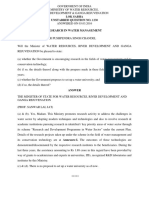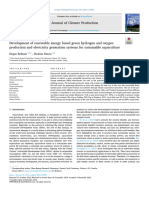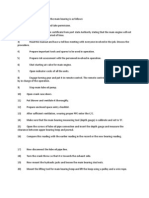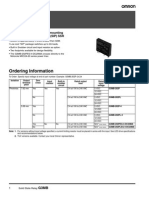JWRD 0140003
JWRD 0140003
Uploaded by
frpkulubuCopyright:
Available Formats
JWRD 0140003
JWRD 0140003
Uploaded by
frpkulubuOriginal Title
Copyright
Available Formats
Share this document
Did you find this document useful?
Is this content inappropriate?
Copyright:
Available Formats
JWRD 0140003
JWRD 0140003
Uploaded by
frpkulubuCopyright:
Available Formats
© 2024 The Authors Water Reuse Vol 14 No 1, iii doi: 10.2166/wrd.2023.
202
Editorial: Innovative strategies for treatment and management of saline water/
wastewater
Increasing global demands for freshwater for household, industrial, and agricultural activities encourage researchers to
develop low-cost and eco-friendly technologies for wastewater recycling and desalination of saline water. Additionally,
proper conservation and management of naturally available freshwater in conjunction with the recycling of wastewater
has become a global priority. Saline water is becoming one of the most important resources, which is available to produce
potable water through desalination. The quality of saline water influences the performance of desalination plants. The
resources for saline water vary from surface (sea water, brackish) to ground (brackish and oil-produced water) with variable
compositions depending upon the geological factors. In addition, industrially generated saline water is another potential
resource. The technologies used to desalinate saline water are costly and energy-intensive. The energy requirement to produce
potable water depends on the quality of feed water, levels of water treatment and the technologies involved. Considering the
emerging trends in water reuse/recycling, this special issue was mainly focused on collecting innovative strategies being devel-
oped for the treatment and management of saline water/wastewater.
This special issue was specifically intended to collect research articles focusing on developing green technologies for saline
water/wastewater treatment and management involving advanced oxidation processes, biological treatment processes, pro-
cess optimization and modelling, employing renewable energy in treatment/recycling processes, nanotechnology,
environmental, and economic aspects of treatment processes, along with thermal and membrane technologies. After careful
consideration and evaluation, 11 research and review articles were accepted for publication as part of this special issue.
Briefly, Rajput et al. 2023 described how machine learning architecture can be employed to optimize and model the treat-
ment process for saline water level analyses efficiently. Anupong et al. (2023) studied the application of deep learning
algorithms that can be used to generate photovoltaic renewable energy in saline water analysis via an oxidation process.
Shen et al. (2022) highlighted the importance of salt-tolerant microbes for recycling saline water and specifically studied
the Halobacillus trueperi S61 isolated from the Qarhan Salt Lake using meta-genomics. Neelakandan et al. (2023) focused
on employing a combination of Internet of Things (IoT) with a nanomaterial-based predictive model for wastewater treat-
ment using Stacked Sparse Denoising Auto-Encoder. Bhavani et al. (2023) highlighted using renewable energy systems
and microgrid architecture can be employed to improve the cost-effectiveness and eco-friendliness of the wastewater treat-
ment processes. Jayakumar et al. (2023) synthesized, characterized, and evaluated the performance of the Chitosan/Nylon 6/
Polyurethane Blend for removing Chromium (VI) and Lead (II) ions from water to highlight its potential applications for
industrial wastewater treatment. Somashekar et al. (2023) reviewed the advancements made in saline water treatment
and recycling to meet the rising global demands of freshwater. Hussain et al. (2023) studied the biosorptive removal of
metal ions from wastewater using highly metal-resistant bacteria isolated from a prominent wastewater drain in Lahore, Paki-
stan. Asefa et al. (2023) investigated the effect of biochar addition with anaerobic digestion of the tannery wastewater to
improve biogas production. Yuvaperiyasamy et al. (2023) studied the performance of sea water desalination by combining
solar still with solar pond. Ocal et al. (2023) investigated the potential pressure-driven membrane process for the reusability
of industrial wastewater.
The Editors are thankful to all authors for their interesting and important contributions and appreciate the assistance pro-
vided by the editorial staff of Water Reuse during the reviewing and publication process. The Editors extend their sincere
gratitude to Editors in Chief and Associate Editors in Chief for their kind guidance and support throughout.
Guest Editors
Deepanraj Balakrishnan
Department of Mechanical Engineering, College of Engineering, Prince Mohammad Bin Fahd University, Al-Khobar 31952,
Saudi Arabia
This is an Open Access article distributed under the terms of the Creative Commons Attribution Licence (CC BY 4.0), which permits copying, adaptation and
redistribution, provided the original work is properly cited (http://creativecommons.org/licenses/by/4.0/).
Downloaded from http://iwaponline.com/jwrd/article-pdf/14/1/iii/1393652/jwrd0140003.pdf
by guest
Water Reuse Vol 14 No 1, iv
Feroz Shaik
Department of Mechanical Engineering, College of Engineering, Prince Mohammad Bin Fahd University, Al-Khobar 31952,
Saudi Arabia
Muhammad Aamer Mehmood
Department of Bioinformatics and Biotechnology, Government College University Faisalabad, Faisalabad 38000, Pakistan
REFERENCES
Anupong, W., Mehbodniya, A., Webber, J. L., Bostani, A., Dhiman, G., Singh, B. & Dharan, A. R. M. 2023 Deep learning algorithms were
used to generate photovoltaic renewable energy in saline water analysis via an oxidation process. Water Reuse 13 (1), 68–81. https://doi.
org/10.2166/wrd.2023.071.
Asefa, S. K., Ancha, V. R., Habtu, N. G. & Sundar, L. S. 2023 Experimental evaluation on the effect of biochar addition with anaerobic
digestion of the tannery wastewater to improve biogas production. Water Reuse 13 (3), 459–474. https://doi.org/10.2166/wrd.2023.061.
Bhavani, N. P. G., Harne, K., Singh, S., Abdukarimovich, O. A., Balaji, V., Singh, B., Vengatesan, K. & Mohanty, S. N. 2023 Economic
analysis based on saline water treatment using renewable energy system and microgrid architecture. Water Reuse 13 (2), 269–281.
https://doi.org/10.2166/wrd.2023.013.
Hussain, A., Hasan, A., Sherzada, S., Noor, T., Ahmad, S., Kaoma, M. & Elsehly, E. M. 2023 Biosorptive removal of selected metal ions from
simulated wastewater using highly metal-resistant bacteria. Water Reuse 13 (3), 448–458. https://doi.org/10.2166/wrd.2023.059.
Jayakumar, S., Sudarsan, S., Sridhar, B., Parthiban, E., Prabu, A. V. & Jha, S. 2023 Synthesis, characterization, and performance of chitosan/
nylon 6/polyurethane blend for the removal of chromium (VI) and lead (II) ions from aqueous solutions for enhanced kinetic adsorption
studies. Water Reuse 13 (3), 319–328. https://doi.org/10.2166/wrd.2023.019.
Neelakandan, S., RajaSekhar Reddy, N. V., Ghfar, A. A., Pandey, S., Kiran, S. & Thillai Arasu, P. 2023 Internet of things with nanomaterials-
based predictive model for wastewater treatment using stacked sparse denoising auto-encoder. Water Reuse 13 (2), 233–249. https://doi.
org/10.2166/wrd.2023.006.
Ocal, Z. B., Karagunduz, A., Keskinler, B., Dizge, N. & Ashqar, H. I. 2023 Investigation of reusability of effluents from an organized
industrial zone wastewater treatment plant using a pressure-driven membrane process. Water Reuse 13 (4), 559–570. https://doi.org/10.
2166/wrd.2023.066.
Rajput, S. P. S., Webber, J. L., Bostani, A., Mehbodniya, A., Arumugam, M., Nanjundan, P. & Wendimagegen, A. 2023 Using machine
learning architecture to optimize and model the treatment process for saline water level analysis. Water Reuse 13 (1), 51–67. https://doi.
org/10.2166/wrd.2022.069.
Shen, S., Li, W., Wang, J. & Xu, R. 2022 Meta-genomic analysis of Halobacillus trueperi S61 isolated from the Qarhan Salt Lake. Water Reuse
12 (4), 460–470. https://doi.org/10.2166/wrd.2022.073.
Somashekar, V., Vivek Anand, A., Hariprasad, V., Elsehly, E. M. & Kapulu, M. 2023 Advancements in saline water treatment: A review.
Water Reuse 13 (3), 475–491. https://doi.org/10.2166/wrd.2023.065.
Yuvaperiyasamy, M., Senthilkumar, N. & Deepanraj, B. 2023 Experimental and theoretical analysis of solar still with solar pond for
enhancing the performance of sea water desalination. Water Reuse 13 (4), 620–633. https://doi.org/10.2166/wrd.2023.102.
Downloaded from http://iwaponline.com/jwrd/article-pdf/14/1/iii/1393652/jwrd0140003.pdf
by guest
You might also like
- Me Formulas and Review ManualDocument162 pagesMe Formulas and Review ManualLynel Arianne TaborNo ratings yet
- 1 Aerobic Granular Sludge The Future of Wastewater Treatment 2019Document11 pages1 Aerobic Granular Sludge The Future of Wastewater Treatment 2019chatgpt85264No ratings yet
- 1 s2.0 S2352186423001049 MainDocument12 pages1 s2.0 S2352186423001049 MainioepdfsopNo ratings yet
- 2019_Book_Water Conservation, Recycling and Reuse- Issues and ChallengesDocument285 pages2019_Book_Water Conservation, Recycling and Reuse- Issues and ChallengesvincentNo ratings yet
- Reuse Study of Sustainable Wastewater in Agroforestry Domain of Marrakesh CityDocument7 pagesReuse Study of Sustainable Wastewater in Agroforestry Domain of Marrakesh Cityabdou abdouNo ratings yet
- Utilization of Solar Energy For Wastewater Treatment: Challenges and Progressive Research TrendsDocument23 pagesUtilization of Solar Energy For Wastewater Treatment: Challenges and Progressive Research Trendsmarceltubia0No ratings yet
- Wastewater Treatment Plant Design and Modeling For The City of ErzurumDocument15 pagesWastewater Treatment Plant Design and Modeling For The City of ErzurumJoãoNo ratings yet
- Analysis of Characteristics of Sewage Water Treatment Plant: November 2023Document8 pagesAnalysis of Characteristics of Sewage Water Treatment Plant: November 2023n4640974No ratings yet
- Oil Palm Empty Fruit Bunch-Based Nanocellulose As A Super-Adsorbent For Water RemediationDocument9 pagesOil Palm Empty Fruit Bunch-Based Nanocellulose As A Super-Adsorbent For Water RemediationzallaishzNo ratings yet
- Proceedings of The Fifth International Groundwater Conference (IGWC-2012)Document43 pagesProceedings of The Fifth International Groundwater Conference (IGWC-2012)prijucpNo ratings yet
- DistillationDocument8 pagesDistillationalparo1806No ratings yet
- 1 s2.0 S266649842300042X MainDocument13 pages1 s2.0 S266649842300042X Mainn0188741wNo ratings yet
- WST 2022159Document16 pagesWST 2022159raquel gonzalezNo ratings yet
- Adv Materials Inter - 2022 - Kumar - Hydrogel Nanocomposite Adsorbents and Photocatalysts For Sustainable WaterDocument50 pagesAdv Materials Inter - 2022 - Kumar - Hydrogel Nanocomposite Adsorbents and Photocatalysts For Sustainable WateryuanliliNo ratings yet
- Effectiveness of Sewage Treatment SystemDocument14 pagesEffectiveness of Sewage Treatment Systemmentwabeasiratu21No ratings yet
- 0644 17554 4FinalFinalDocument18 pages0644 17554 4FinalFinalPoonguzhaliNo ratings yet
- Aerobic Granular Sludge: The Future of Wastewater Treatment: Y. V. Nancharaiah, M. Sarvajith and T. V. Krishna MohanDocument10 pagesAerobic Granular Sludge: The Future of Wastewater Treatment: Y. V. Nancharaiah, M. Sarvajith and T. V. Krishna Mohansong1088100% (1)
- SolarDocument3 pagesSolarBala LakshmanNo ratings yet
- Final Synopsis TRRRDocument9 pagesFinal Synopsis TRRRriteshvinayakmshutteredbitNo ratings yet
- Mosquera SynthesisDocument5 pagesMosquera Synthesismarkadizon17No ratings yet
- Water PollutionDocument10 pagesWater Pollutiongabriel muthamaNo ratings yet
- Investigative Studies On Impact of Waste Water Irrigation On Soil Characteristics and Crop QualityDocument10 pagesInvestigative Studies On Impact of Waste Water Irrigation On Soil Characteristics and Crop Qualitymaran2326No ratings yet
- Ws 022011120Document11 pagesWs 022011120abdulwahabanwar056No ratings yet
- Lok Sabha Unstarred Question NoDocument2 pagesLok Sabha Unstarred Question NoArun SharmaNo ratings yet
- 10 AnnexuresDocument13 pages10 AnnexuresMohit SidhdhaparaNo ratings yet
- Asi 04 00016 v2Document10 pagesAsi 04 00016 v2Natalia NacolaNo ratings yet
- Efficiency of Activated Carbon Produced From Rice Husk in Water TreatmentDocument7 pagesEfficiency of Activated Carbon Produced From Rice Husk in Water TreatmentIJRASETPublicationsNo ratings yet
- Nanotechnologyreviewpaper 2013ISetalDocument7 pagesNanotechnologyreviewpaper 2013ISetalOnline JobNo ratings yet
- Development of Renewable Energy Based Green Hydrogen and Oxygen Production and Electricity Generation Systems For Sustainable AquacultureDocument12 pagesDevelopment of Renewable Energy Based Green Hydrogen and Oxygen Production and Electricity Generation Systems For Sustainable AquacultureGabriela RochaNo ratings yet
- Methane 02 00014Document26 pagesMethane 02 00014nebex12No ratings yet
- Forward Osmosis As A Platform For Resource Recovery From Municipalwastewater - A Critical Assessment of The Literature PDFDocument12 pagesForward Osmosis As A Platform For Resource Recovery From Municipalwastewater - A Critical Assessment of The Literature PDFamalNo ratings yet
- Potabilización de AguaDocument9 pagesPotabilización de AguaSHEILA GINIVA BUSTOS YAIMANo ratings yet
- Muruganandam - 2017 - IOP - Conf. - Ser. - Mater. - Sci. - Eng. - 263 - 032006 ENDocument12 pagesMuruganandam - 2017 - IOP - Conf. - Ser. - Mater. - Sci. - Eng. - 263 - 032006 ENZineb ALLOULINo ratings yet
- Novel Wastewater Treatment Applications Using Polymeric MaterialsDocument352 pagesNovel Wastewater Treatment Applications Using Polymeric Materialssri kanthNo ratings yet
- Evaluation of High Rate MBBR to Predict Optimal Design Parameters for Higher Carbon and Subsequent Ammoniacal Nitrogen RemovalDocument7 pagesEvaluation of High Rate MBBR to Predict Optimal Design Parameters for Higher Carbon and Subsequent Ammoniacal Nitrogen Removal高昆No ratings yet
- Elbhnsawi 2024 J. Phys. Conf. Ser. 2830 012009Document7 pagesElbhnsawi 2024 J. Phys. Conf. Ser. 2830 012009Nessren FarragNo ratings yet
- FYP 1 ProposalDocument16 pagesFYP 1 ProposalTalha khanNo ratings yet
- Design of Portable Hybrid Constructed Wetland Reactor For The Treatment of WastewaterDocument8 pagesDesign of Portable Hybrid Constructed Wetland Reactor For The Treatment of WastewaterIJRASETPublicationsNo ratings yet
- Journal Pre-Proof: Science of The Total EnvironmentDocument53 pagesJournal Pre-Proof: Science of The Total EnvironmentAnna ZuñigaNo ratings yet
- Nitrogen RemovalDocument11 pagesNitrogen RemovalRamani Bai V.No ratings yet
- Ponds & Lake Solar-Powered Water Body CleanerDocument3 pagesPonds & Lake Solar-Powered Water Body CleanerInternational Journal of Innovative Science and Research TechnologyNo ratings yet
- RRL OutlineDocument4 pagesRRL OutlineKirsten SaavedraNo ratings yet
- Water Quality Research Journal Vol 58 No 4Document11 pagesWater Quality Research Journal Vol 58 No 4Otoma OrkaidoNo ratings yet
- JW RD 0130545Document14 pagesJW RD 0130545Amdjed HydrauNo ratings yet
- 1-s2.0-S0022286024034112-main (1)Document12 pages1-s2.0-S0022286024034112-main (1)Sibsankar RahutNo ratings yet
- E3sconf Icgest2023 02003Document14 pagesE3sconf Icgest2023 02003shalendradscrossingNo ratings yet
- Rapisarda Icws 2018 4021933 Finalrev1Document32 pagesRapisarda Icws 2018 4021933 Finalrev1abdulNo ratings yet
- Water 15 00987 With CoverDocument18 pagesWater 15 00987 With Covernguyenlinh.astNo ratings yet
- Sustainability 15 16083 v3Document16 pagesSustainability 15 16083 v3abdou abdouNo ratings yet
- Report On Anaerobic Digestion of Water Hyacinth - RitikaDocument15 pagesReport On Anaerobic Digestion of Water Hyacinth - RitikaRitesh KumarNo ratings yet
- Water Treatment Process Using Conventional and AdvDocument12 pagesWater Treatment Process Using Conventional and AdvEka SaputraNo ratings yet
- Low_Carbon_Water_Treatment_and_Energy_RecoveryDocument234 pagesLow_Carbon_Water_Treatment_and_Energy_RecoveryNicole FelicianoNo ratings yet
- Solar Based Water Purification SystemDocument4 pagesSolar Based Water Purification SystemOjas GokhaleNo ratings yet
- Advanced Industrial Wastewater Treatment and Reclamation of WaterDocument271 pagesAdvanced Industrial Wastewater Treatment and Reclamation of WaterMustapha ZouantiNo ratings yet
- Chapter 1 3 1Document25 pagesChapter 1 3 1Tirso R. ArnillaNo ratings yet
- Hora University-1Document25 pagesHora University-1metadelaschale64No ratings yet
- Beeswax ArticleDocument11 pagesBeeswax ArticleDanladi BisuNo ratings yet
- MAS Report PDF FinalDocument6 pagesMAS Report PDF FinalShreeJeethNo ratings yet
- Biopolymer - A Sustainable and Efficacious Material System For Effluent RemovalDocument23 pagesBiopolymer - A Sustainable and Efficacious Material System For Effluent RemovalVeronica HernandezNo ratings yet
- so sánh lọc cátDocument14 pagesso sánh lọc cátchau.vo301792659No ratings yet
- Modelling A Pre-Chamber Injection System For Natural Gas Engines in Matlab-Simulink EnvironmentDocument106 pagesModelling A Pre-Chamber Injection System For Natural Gas Engines in Matlab-Simulink EnvironmentManfredi NotarangeloNo ratings yet
- Forced ConvectionDocument9 pagesForced ConvectionS Sweet SweetNo ratings yet
- MTS Bogie Testing System - B2TKS - SpecificationDocument39 pagesMTS Bogie Testing System - B2TKS - SpecificationAndrean SuryaNo ratings yet
- Main Bearing Removal ProcedureDocument2 pagesMain Bearing Removal ProcedureShamsher SinghNo ratings yet
- QP PPE ModelDocument2 pagesQP PPE ModelculvertsNo ratings yet
- Thermodynamics (C) - JEE Main 2021 July Chapter-Wise - MathonGoDocument5 pagesThermodynamics (C) - JEE Main 2021 July Chapter-Wise - MathonGoআমি স্নেহাশীষNo ratings yet
- Ds ES54 Section s1 01Document11 pagesDs ES54 Section s1 01jasontsilverNo ratings yet
- Benefits of Operating Doubly Fed Induction Generators by ModularDocument8 pagesBenefits of Operating Doubly Fed Induction Generators by ModularDeepak GehlotNo ratings yet
- 498 Datasheet enDocument2 pages498 Datasheet enmurad asadovNo ratings yet
- 130-10 - Model 800 Viscometer - BrochureDocument2 pages130-10 - Model 800 Viscometer - BrochureGary Cartagena UgarteNo ratings yet
- DTU, Department of Energy Engineering S in (KJ/ (KG K) ) - V in (M 3/kg) - T in (ºC) M.J. Skovrup & H.J.H Knudsen. 10-11-07 Ref:R.Döring. Klima+Kälte Ingenieur Ki-Extra 5, 1978Document1 pageDTU, Department of Energy Engineering S in (KJ/ (KG K) ) - V in (M 3/kg) - T in (ºC) M.J. Skovrup & H.J.H Knudsen. 10-11-07 Ref:R.Döring. Klima+Kälte Ingenieur Ki-Extra 5, 1978Willian SouzaNo ratings yet
- Ch30 Giancoli7e ManualDocument30 pagesCh30 Giancoli7e ManualRMNo ratings yet
- Power Electronics Second Series QPDocument2 pagesPower Electronics Second Series QPsyulmnmd100% (1)
- Reuse and Recycle of Paper: Prepared By: Roll No: FacultyDocument28 pagesReuse and Recycle of Paper: Prepared By: Roll No: FacultybrainscordNo ratings yet
- TIG ManualDocument9 pagesTIG Manual77No ratings yet
- Gate Aerospace 2019 SolutionDocument40 pagesGate Aerospace 2019 SolutionJackobNo ratings yet
- @@@ Geothermal-WellsDocument44 pages@@@ Geothermal-WellsstarykltNo ratings yet
- 303-03 Engine Cooling 2.3L EcoBoost - Removal and Installation - Coolant Outlet ConnectorDocument12 pages303-03 Engine Cooling 2.3L EcoBoost - Removal and Installation - Coolant Outlet ConnectorCARLOS LIMADANo ratings yet
- 2004 Chemistry - James Ruse With SolutionsDocument36 pages2004 Chemistry - James Ruse With SolutionsWilliam HouNo ratings yet
- Caliper Ranger and Explorer Disassembly and Assembly PDFDocument2 pagesCaliper Ranger and Explorer Disassembly and Assembly PDFMichael HernandezNo ratings yet
- Melt Crystallization: Main Features of Interest To The Chemical IndustryDocument2 pagesMelt Crystallization: Main Features of Interest To The Chemical IndustryRaj MishraNo ratings yet
- Tolerance of Performance Curves According To UNI EN ISO 9906: 2002 NormsDocument4 pagesTolerance of Performance Curves According To UNI EN ISO 9906: 2002 NormsJose Ricardo Sarco BaluarteNo ratings yet
- Himel CatalogueDocument356 pagesHimel CatalogueTapelea Cristian100% (1)
- FME 522 THERMODYNAMICS V-Section I NotesDocument26 pagesFME 522 THERMODYNAMICS V-Section I NotesKatesh GumaNo ratings yet
- MotorDocument48 pagesMotorD. Thanh Nguyễn100% (1)
- Engine Overhaul: Installation NoticeDocument19 pagesEngine Overhaul: Installation NoticeEdvaldo GalvaoNo ratings yet
- Common Expressions For Discussion: Word List On CommentsDocument59 pagesCommon Expressions For Discussion: Word List On CommentsDhycka JangkaNo ratings yet
- Basic EFIDocument6 pagesBasic EFIvictorjoseteixeiraNo ratings yet
- G3MB 202Document5 pagesG3MB 202Saw LinNo ratings yet

























































































